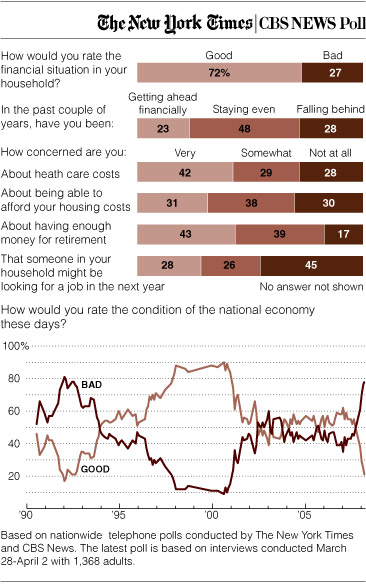| Tweet |

http://ameblo.jp/warm-heart/entry-10086118536.html から転載。 2008-04-06 17:49:57 ニューヨーク・タイムズ紙がCBSニュースと共同実施した世論調査で、アメリカ人の圧倒的多数がアメリカの進んでいる方向は間違っていると答えたそうだ。だったらそんな国と心中さえしかねないほどの眉米政権を持つわが日本国の行く先はどうなるのだ。もう破滅するしかないということになるではないか!あな恐ろしや!あな恐ろしや!どこへ行く、日本。 ============================================ http://news.livedoor.com/article/detail/3585598/ 「米は間違った道を進んでいる」米国人の8割が認識 新華社総合:米国で行われた最新の世論調査によると、市民の81%が米国が間違った道を進んでいると感じている。1990年代初期以降最高の水準となった。 この調査はニューヨークタイムズとCBSニュースが共同で実施。3月28日から4月2日にかけて、1368人の同国市民に電話で意見を聞いた。調査結果は3日、ニューヨークタイムズのウェブサイトに掲載された。誤差は3%だという。 調査結果によると、81%の市民が米国は間違った道を進んでおり、しかも深刻な問題に直面していると感じている。このような意見を持つ市民は、2007年には69%、02年に到っては35%しかいなかった。 また米国経済が好調だという市民はわずか21%。1992年以来最低の水準となっている。さらに米国経済はすでに衰退期に入っていると答えた市民も70%近くいた。 今回のサブプライム危機が米国経済に重大な影響を及ぼしたと調査は物語っているが、米国人の多くはその責任は政府ではなく銀行、あるいは不動産オーナーにあると見ている。78%が現在の米国の状況は5年前より悪いと見ており、以前よりもよくなったと答えた人はわずか4%しかいなかった。 【翻訳編集:JCBB(O.T)/G-SEARCH】 ============================================ ニューヨーク・タイムズ紙の英文記事はこちら ⇒ http://www.nytimes.com/2008/04/04/us/04poll.html?_r=1&hp&oref=slogin Americans are more dissatisfied with the country’s direction than at any time since the New York Times/CBS News poll began asking about the subject in the early 1990s, according to the latest poll. In the poll, 81 percent of respondents said they believed “things have pretty seriously gotten off on the wrong track,” up from 69 percent a year ago and 35 percent in early 2002. Although the public mood has been darkening since the early days of the war in Iraq, it has taken a new turn for the worse in the last few months, as the economy has seemed to slip into recession. There is now nearly a national consensus that the country faces significant problems. A majority of nearly every demographic and political group — Democrats and Republicans, men and women, residents of cities and rural areas, college graduates and those who finished only high school — say the United States is headed in the wrong direction. Seventy-eight percent of respondents said the country was worse off than five years ago; just 4 percent said it was better off. The dissatisfaction is especially striking because public opinion usually hits its low point only in the months and years after an economic downturn, not at the beginning of one. Today, however, Americans report being deeply worried about the country even though many say their own personal finances are still in fairly good shape. Only 21 percent of respondents said the overall economy was in good condition, the lowest such number since late 1992, when the recession that began in the summer of 1990 had already been over for more than a year. In the latest poll, two in three people said they believed the economy was in recession today. The unhappiness presents clear risks for Republicans in this year’s elections, given the continued unpopularity of President Bush. Twenty-eight percent of respondents said they approved of the job he was doing, a number that has barely changed since last summer. But Democrats, who have controlled the House and Senate since last year, also face the risk that unhappy voters will punish Congressional incumbents. Mr. Bush and leaders of both parties on Capitol Hill have moved in recent weeks to react to the economic slowdown, first by passing a stimulus bill that will send checks of up to $1,200 to many couples this spring. They are now negotiating over proposals to overhaul financial regulations, blunt the effects of a likely wave of home foreclosures and otherwise respond to the real estate slump and related crisis on Wall Street. The poll found that Americans blame government officials for the crisis more than banks or home buyers and other borrowers. Forty percent of respondents said regulators were mostly to blame, while 28 percent named lenders and 14 percent named borrowers. In assessing possible responses to the mortgage crisis, Americans displayed a populist streak, favoring help for individuals but not for financial institutions. A clear majority said they did not want the government to lend a hand to banks, even if the measures would help limit the depth of a recession. “What I learned from economics is that the market is not always going to be a happy place,” Sandi Heller, who works at the University of Colorado and is also studying for a master’s degree in business there, said in a follow-up interview. If the government steps in to help out, said Ms. Heller, 43, it could encourage banks to take more foolish risks. “There are a million and one better ways for the government to spend that money,” she said. Respondents were considerably more open to government help for home owners at risk of foreclosure. Fifty-three percent said they believed the government should help those whose interest rates were rising, while 41 percent said they opposed such a move. The nationwide telephone survey of 1,368 adults was conducted from March 28 to April 2. The margin of sampling error was plus or minus 3 percentage points. When the presidential campaign began last year, the war in Iraq and terrorism easily topped Americans’ list of concerns. Almost 30 percent of people in a December poll said that one of those issues was the country’s most pressing problem. About half as many named the economy or jobs. But the issues have switched places in just a few months’ time. In the latest poll, 17 percent named terrorism or the war, while 37 percent named the economy or the job market. When looking at the current state of their own finances, Americans remain relatively sanguine. More than 70 percent said their financial situation was fairly good or very good, a number that has dropped only modestly since 2006. Yet many say they are merely managing to stay in place, rather than get ahead. This view is consistent with the income statistics of the past five years, which suggest that median household income has still not returned to the inflation-adjusted peak it hit in 1999. Since the Census Bureau began keeping records in the 1960s, there has never been an extended economic expansion that ended without setting a new record for household income. Economists cite a variety of factors for the sluggish income growth, including technology and globalization, and it clearly seems to have made Americans anxious about the future. Fewer than half of parents — 46 percent — said they expected their children to enjoy a better standard of living than they themselves do, down from 56 percent in 2005. Respondents were more pessimistic when asked in general terms about the next generation, with only a third saying it would live better than people do today. (Polls usually find people more upbeat about their personal situation than about the state of society, but the gap is now larger than usual.) Charles Parrish, a 56-year-old retired fireman in Evans, Ga., who now works a maintenance job for the local school system, said he was worried the country was not preparing children for the high-technology economy of the future. Instead, the government passed a stimulus package that simply sends checks to taxpayers and worsens the deficit in the process. “Who’s going to pay back the money?” Mr. Parrish, an independent, said. “We are. They are giving me money, except I’m going to have to pay interest on it.” Democrats have asserted recently that the lack of wage growth has made people more open to government intervention in the economy than in the past, and the poll found mixed results on this score. Fifty-eight percent of respondents said they would support raising taxes on households making more than $250,000 to pay for tax cuts or government programs for people making less than that amount. Only 38 percent called it a bad idea. Both Senator Hillary Rodham Clinton and Senator Barack Obama, the Democratic presidential candidates, have made proposals along these lines. More broadly, 43 percent of those surveyed said they would prefer a larger government that provided more services, which is tied for the highest such number since The Times and CBS News began asking the question in 1991. But an identical 43 percent said they wanted a smaller government that provided fewer services. And although both Mrs. Clinton and Mr. Obama have blamed trade with other countries for some of the economy’s problems, Americans say they continue to favor trade — if not quite as strongly as in the past. Fifty-eight percent called it good for the economy; 32 percent called it bad, up from 17 percent in 1996. At the same time, 68 percent said they favored trade restrictions to protect domestic industries, instead of allowing unrestrained trade. In early 1996, 55 percent favored such restrictions.
gataro-cloneの投稿
「米は間違った道を進んでいる」米国人の8割が認識【NYtimes(新華社総合抄訳から和訳)】
テーマ:世界の動き
2008年04月06日10時43分
今年の大統領選では経済がイラク問題よりも重要な焦点になると市民は見ている。ブッシュ大統領の路線を支持する人は28%しかいなかった。
81% in Poll Say Nation Is Headed on Wrong Track
By DAVID LEONHARDT and MARJORIE CONNELLY
Published: April 4, 2008
|
|
- 物事の正当性・客観性は、多数決では決まらないんですよ DOMOTO 2008/4/11 23:53:42
(0)
- 実はブッシュこそが、歴代の大統領で一番良かったとの説 Narongchai 2008/4/08 02:27:41
(0)
|
|
投稿コメント全ログ コメント即時配信 スレ建て依頼 削除コメント確認方法
|
|
 題名には必ず「阿修羅さんへ」と記述してください。
題名には必ず「阿修羅さんへ」と記述してください。
掲示板,MLを含むこのサイトすべての
一切の引用、転載、リンクを許可いたします。確認メールは不要です。
引用元リンクを表示してください。
|
|
|
|
|
|
|
|